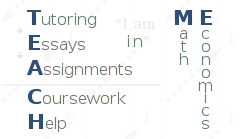Section 3.3: Problem 3 Solution
Working problems is a crucial part of learning mathematics. No one can learn... merely by poring over the definitions, theorems, and examples that are worked out in the text. One must work part of it out for oneself. To provide that opportunity is the purpose of the exercises.
James R. Munkres
A theory
(in a language with
and
) is called
-complete iff for any formula
and variable
, if
belongs to
for every natural number
, then
belongs to
. Show that if
is a consistent
-complete theory in the language of
and if
, then
.
Let
be a sentence (in the language of
) in the prenex normal form (Section 2.6). We use induction on the number of quantifiers in
to show that
iff
is true in
. We already know by the preceding exercise that for every quantifier-free sentence
, if
is true in
, then
, hence,
, and if
is false in
, then
, hence,
. If
is true in
, where
is the only free variable in
, then for all
,
, and, by hypothesis,
, but then, since
is
-complete,
. If
is true in
, then for some
,
, and, by hypothesis,
, but then
. Now, if
or
is false in
, then
(which is logically equivalent to
or
, respectively) is true in
, and, hence,
. Therefore, by induction, we conclude that
(
) iff
is true in
(
) (here, we use the fact the
is consistent).
Note.
is not
-complete. For example, if
, then
for every
, however,
, which is axiom S3 of
.
